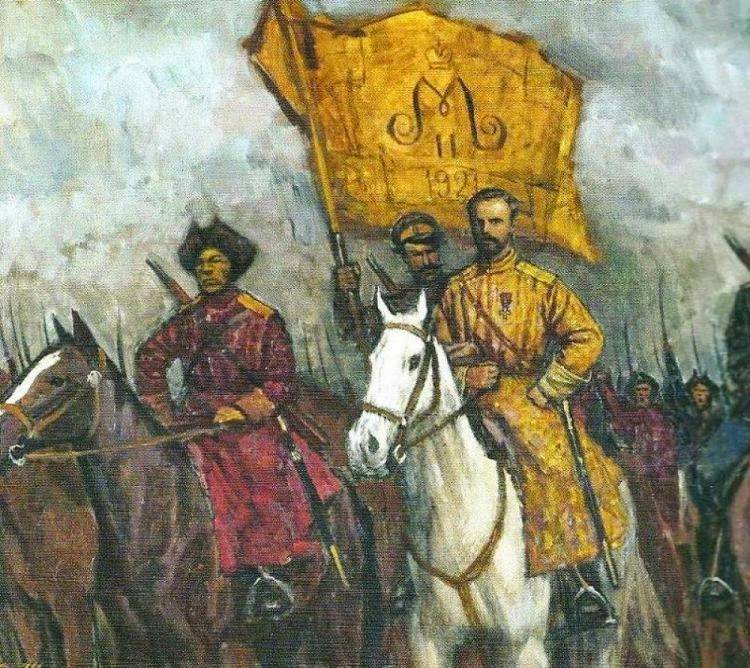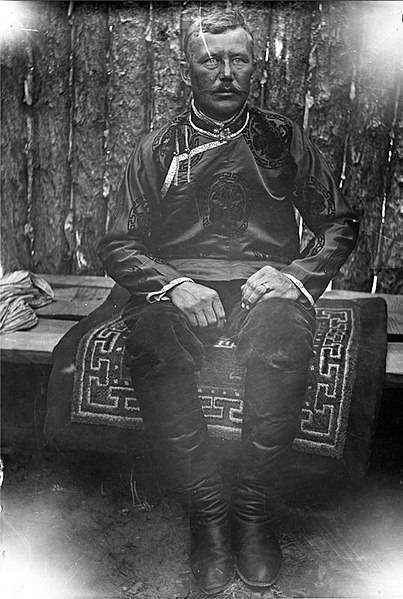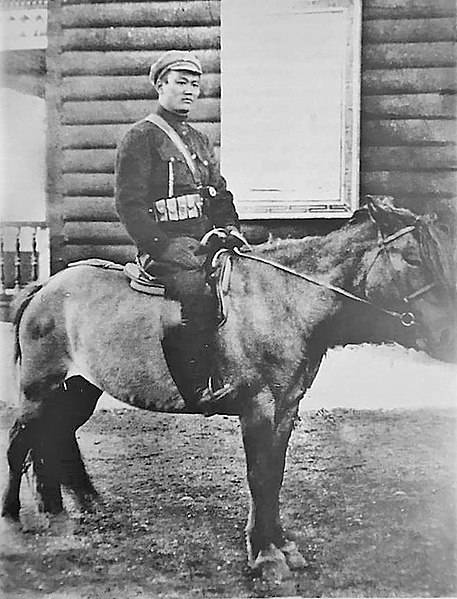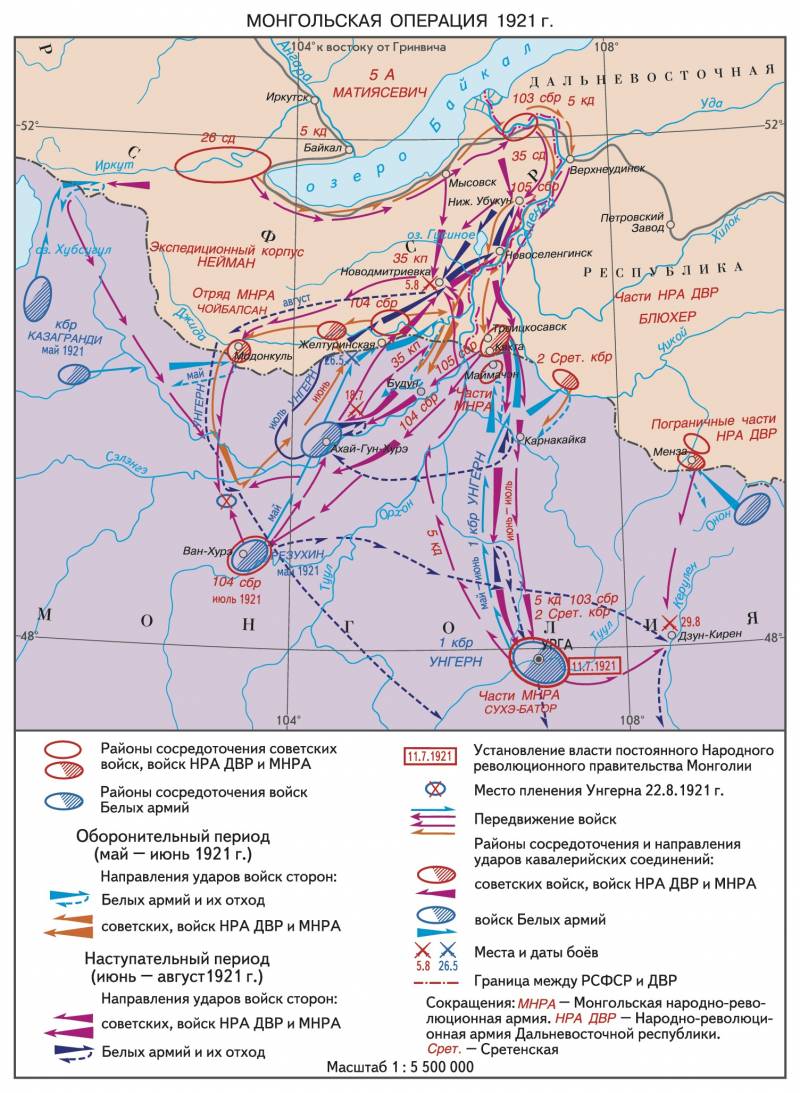How Baron Ungern's Northern Expedition failed

Liberation of Bogdo Gegen
After the first unsuccessful attempts to occupy Urga (Mongolian campaign), the detachment of Baron Ungern-Sternberg went to the river. Tereldzhiin-Gol to the upper reaches of Tuul, and then to Kerulen. During the winter period, the White Guards faced a number of difficulties. Frost, chronic malnutrition, lack of supplies and the prospects of fighting the Bolsheviks led people to a feeling of complete hopelessness. Desertion began not only among ordinary soldiers, but also among officers. The White General fought this phenomenon with the most severe methods.
However, soon Ungern was able to establish relations with local residents. The Mongols are beginning to see the Russian liberators from the Chinese invaders. The Russian general established relations with the princes and lamas of North-Eastern Mongolia. He struck up a correspondence with the head of Mongolian Buddhists, Bogdo-gegen, who was under arrest at his residence in Urga. The Mongols recognized Ungern as the leader who must liberate Mongolia. The ranks of the white division are replenished with Mongol soldiers. The supply issue was resolved. In addition, the whites began to intercept the caravans.
At the end of January 1921, two hundred Tibetans came to the baron. They became part of a separate division under the command of Warrant Officer Tubanov. The Tibetans, unlike the local Mongols, were good warriors. On February 2, Tibetans disguised as local priests-lamas made their way into the palace of the Mongol ruler, disarmed the Chinese guards and carried Bogdo-gegen (he was almost blind) and his wife from the palace. Bogdo and his family were safely delivered to the camp of the Ungernovites. On the same day, the White Guards captured important positions at Urga.
The fall of Urga
After the liberation, Bogdo Ungren began the assault on Urga. Under his command there were about 1,5 thousand soldiers, 4 guns and 12 machine guns. The Chinese garrison numbered about 7 thousand people with 18 guns and 72 machine guns. The Chinese had a complete numerical and fire advantage. However, the Chinese command did not use the available time to strengthen the defense and did not establish reconnaissance. The Chinese were frightened by rumors about the formation of the Mongol army by Ungern and a successful operation to free Bogdo.
On February 3, the White Guards rested and prepared for the attack. Large bonfires were lit on the hills around the city, it seemed that strong reinforcements had approached Ungern.
On the night of February 4, the Asian Division launched a decisive attack from the east. Rezukhin took off the enemy guards. In the morning, General Ungern personally led the soldiers to storm the white barracks, one of the strongest defense sectors of the Mongolian capital. The Ungernovites captured the barracks, but stubborn battles began in the narrow streets of the trading settlement of Maimachen, in which the White Guards suffered serious losses. The Chinese, supported by artillery, tried to counterattack and use their numerical advantage. But the guns of the whites fired better, the Chinese garrison was defeated, about 500 people were taken prisoner. A panicky flight of the Chinese began.
By evening, the city as a whole was taken. The first to escape from Urga in two vehicles were the head of the Chinese garrison and all the senior officers. Then the main Chinese forces left the city and left along the Troitskosavsky tract. The next day, the Whites cleared the city of small enemy groups. Ungern's division captured good trophies: 16 cannons, 60 machine guns, 5 thousand rifles, 500 thousand cartridges.

Mongolia at Ungern
The Mongolian capital met Ungern as a liberator. About 60 Russian officers were released from the Urginsky prison, whom the Chinese accused of spying for the White Guards. Roman Fedorovich practically did not interfere in the life of the local population, but he dealt with his enemies cruelly. During the occupation of the city, they killed all the "red" elements and staged a Jewish pogrom.
Mongolia's autonomy was restored. Bogdo-gegen again became the ruler of the country. Bogdo bestowed upon Roman Ungern the title of darkhan-khoshoi-chin-wan in the degree of khan. The lamas gave the baron an old gold signet ring with a ruby swastika (according to legend, it belonged to Genghis Khan himself). Many Russian officers received the ranks of Mongol princes. Rezukhin received the title "tsin-wang" - "shining prince".
In the spring of 1921, Ungern's troops completed the defeat of the Chinese forces in Mongolia. The White Guards captured the Chinese military bases in Choirin and Zamyn-Uude in the south of the country. Part of the Chinese troops, which fled after the fall of Urga to the north, tried to pass in the area of the capital and go to China. However, they were re-defeated by the Cossacks and Mongols in the area of the Urga-Ulyasutai tract near the Tola River in central Mongolia. Some of the Chinese troops surrendered, some were able to escape to China. All of Outer Mongolia was liberated from the Chinese presence. Fragmented and weak China could not regain its position in Mongolia. Another thing is Soviet Russia, in which Ungern's successes in Mongolia caused great concern.
Northern hike
On May 21, 1921, Ungern-Sternberg issued an order to begin a campaign against Russia with the aim of eliminating Soviet power in Siberia. Whites hoped for a widespread anti-Soviet uprising. The division was divided into two brigades under the command of Lieutenant General Ungern and Major General Rezukhin. The 1st brigade consisted of the 1st Cavalry Regiment of Esaul Parygin, the 4th Cavalry Regiment of the military foreman (then foreman Arkhipov), the Chinese, Mongolian, Chahar and Tibetan divisions, two artillery batteries and a machine-gun command. The 2nd brigade included the 2nd and 3rd cavalry regiments of Colonel Khobotov and the centurion Yankov, the Mongolian division, the Japanese company, one battery and a machine-gun team.
The Rezukhin brigade was supposed to cross the border in the area of the village of Tsezhinskaya and, acting on the left bank of the Selenga, go to Mysovsk and Tataurovo, violating the enemy rear. Ungern himself aimed at Troitskosavsk, Selenginsk and Verkhneudinsk. Ungern's division grew stronger and numbered over 4 thousand soldiers. In the Ungern brigade there were more than 2 thousand people with 8 guns and 20 machine guns, in the Rezukhin brigade there were more than 1500 soldiers with 4 guns and 10 machine guns. About 500 people remained in Urga. In addition, there were several separate detachments of whites in Mongolia, which were formally subordinate to the baron.
The general forces of the whites reached 7-10 thousand people. The baron had practically no manpower reserves. In Urga, several dozen Kolchak officers joined the division, who ended up in Mongolia in different ways. Mobilization produced a small influx of soldiers. Already in the course of hostilities, the Baron again had to replenish units at the expense of captured Red Army soldiers.
There was also a shortage of guns, machine guns and ammunition. The baron also begins to experience a lack of financial resources. Large sums went into the pockets of the lamas providing support to the locals for the purchase of horses, livestock and provisions. In Urga, the money and valuables of the Chinese Bank, Tsentrosoyuz were seized, the property of the escaped Chinese, Jews and pro-Soviet elements was confiscated. But this was not enough for the war.
It is worth noting that the Soviet command itself planned the operation with the aim of defeating the troops of the White Guards and Mongol feudal lords. The operation was planned to begin in the winter of 1920-1921, but was postponed due to possible international complications. Therefore, the offensive of the Ungern division became a good reason for interfering in the affairs of Mongolia.
In 1920, with the support of the Comintern, the Mongolian People's Party was created, headed by D. Bodo. In Irkutsk, the publication of "Mongolskaya Pravda" begins. Mongolian revolutionaries asked Moscow to help restore Mongolia's independence. In February 1921, the formation of the Mongolian People's Army began, led by Sukhe-Bator. It was created with the help of Soviet advisers. In May 1921 alone, more than 2 thousand rifles, 12 machine guns, etc. were handed over to the Red Mongols.
In March 1921, at a congress in Kyakhta, the Central Committee of the party was elected, the goals and objectives of the future revolution were determined. The Central Committee of the party formed the people's provisional government of Mongolia. On March 18, Sukhe-Bator's militia defeated the Chinese garrison and took Altan-Bulak. In May, at the request of the provisional Mongolian government, the Soviet command began preparations for the Mongol operation. The expeditionary corps of the 5th Army of M. Matiyasevich was formed, the troops of the People's Revolutionary Army of the Far East Republic and the Mongolian troops of Sukhe-Bator also took part in the operation.
In May 1921, the White Guards began moving north. On May 26, Rezukhin's troops defeated a Red detachment, which crossed into Mongolian territory near the border. Rezukhin's brigade crossed the border and moved towards the village of Zhelturinskaya. The Ungernovites defeated several Red detachments and by June 7 they advanced north of Bilyutai. However, the enemy had an advantage in manpower and means, there was no connection with Ungern's brigade, and there was a threat of encirclement. Rezukhin on June 8 began a retreat and went to Mongolia. Meanwhile, the Ungern brigade, along with the white Mongols along the river. Selenge advanced on Troitskosavsk (now Kyakhta). On June 11-13, in the battles for Troitskosavsk, the baron's troops were defeated and suffered heavy losses.
On June 27, 1921, the expeditionary corps of the 5th Army, the NRA of the Far Eastern Republic and the Red Mongols of Sukhe-Bator launched an offensive in Mongolia. On July 6, the Reds entered Urga, which the Whites left without a fight. The provisional Mongolian government became permanent, Sukhe-Bator became the Minister of War. Bogdo handed over to Sukhe-Bator the state seal - a symbol of the highest power in the country. A limited monarchy was proclaimed in Mongolia.
Meanwhile, Ungern crossed the Selenga and linked up with Rezukhin's brigade. Under his command there were now over 3 thousand people with 6 guns and 36 machine guns. On July 18, 1921, the White Guards again launched an offensive on Mysovsk and Verkhneudinsk. The "God of War" won several victories. So, on August 1, the red detachment was defeated near the village. Goose Lake. The Whites captured 300 people, captured 2 cannons, 6 machine guns, 500 rifles and a baggage train.
But on the whole, the situation was unfavorable. The expectation of an extensive revolt in Siberia was not justified. The FER authorities introduced a state of siege in the Verkhneudinsk area, regrouped troops, and transferred reinforcements. The White Guards, lacking sources of replenishment of manpower, a rear base, could not withstand the numerically superior, well-armed and trained troops of the 5th Red Army and the FER army. There was a threat of blocking and complete destruction. On August 3, Unger began a retreat to Mongolia. We left with battles. Ungern's brigade marched in the vanguard, Rezukhin's brigade in the rear, covering the retreat. In mid-August, the Whites returned to Mongolia.
Death
Roman Fedorovich was not going to stop fighting. At first, he wanted to withdraw the division to the west for the winter, to Uryankhai (Tuva). Then he decided to go to Tibet. However, this idea did not inspire enthusiasm among his subordinates. They were tired of the pointless struggle and did not see any prospects in this campaign. Only death. As a result, a conspiracy matured to assassinate the "mad baron" and leave for Manchuria, from where it was possible to get to Primorye or Europe.
On August 16, Ungern-Sternberg's closest associate, Boris Rezukhin, was killed. The division commander's tent was shelled, but he was able to escape with a few close officers. The Asian division under the command of Colonel Ostrovsky and the chief of staff of the division, Colonel Tornovsky, went east to Manchuria. In Manchuria, the division was disarmed and disbanded.
On August 19, Ungern met the Mongolian division of his division and tried to win it over to his side. On August 20, they arrested him and decided to hand him over to the whites (his former subordinates in the division). But on the way, Ungern was intercepted by the red partisans. On September 15, 1921, a demonstration trial over a white general took place in Novonikolaevsk. The baron was accused of an armed struggle against Soviet power under the auspices of the Japanese and of war crimes. The verdict was carried out on the same day.
Bogdo-gegen, after receiving the news of the death of Ungern, ordered to serve prayers for him in all Buddhist sanctuaries. This is how the path of one of the brightest white commanders, the "god of war", who dreamed of destroying the "world evil" of nihilism and lack of spirituality, and creating a new world monarchy ended. And start a "crusade" against the West (Global project of the "god of war" Ungern).


Information